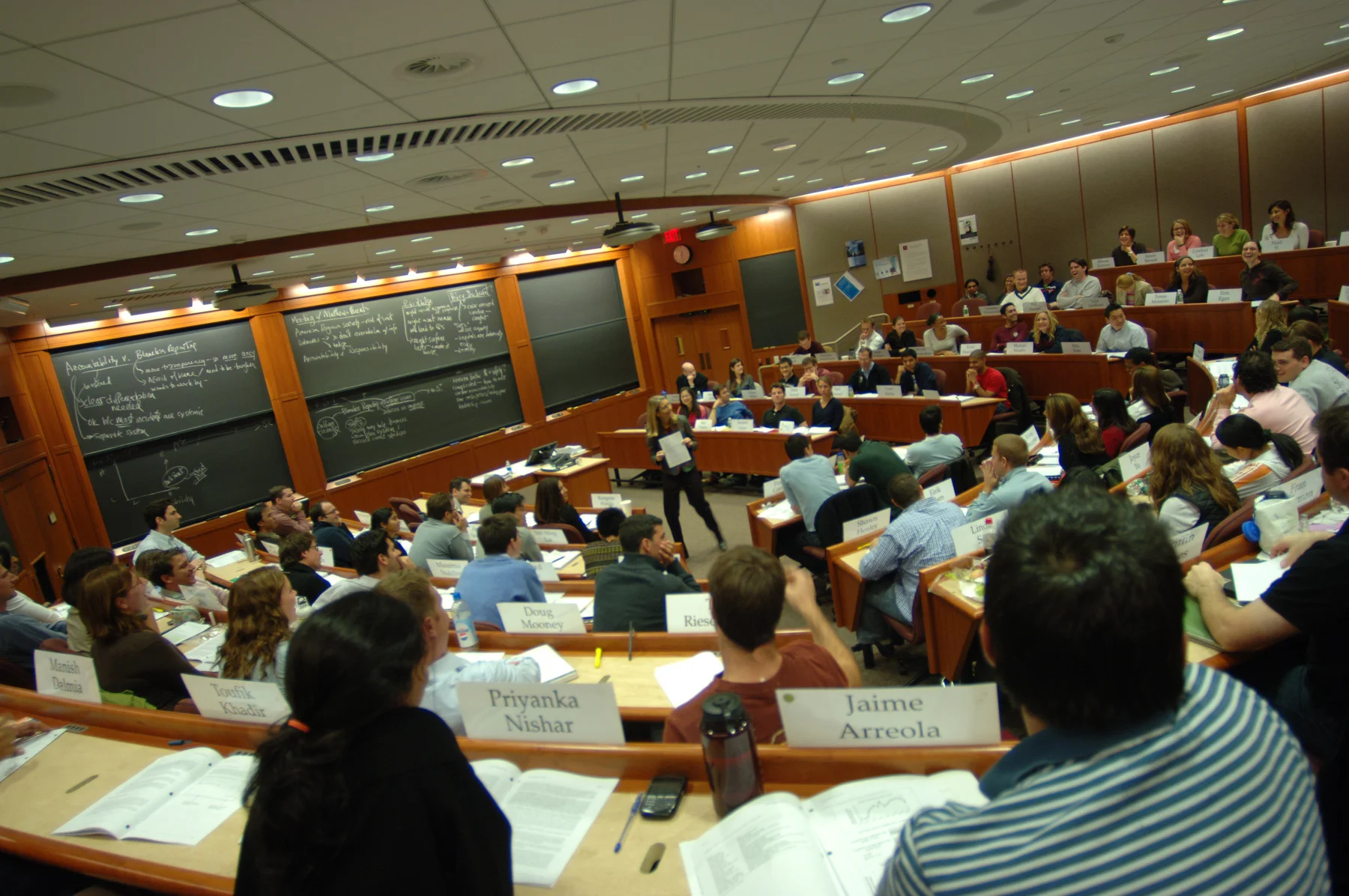Applying to B-School in a Few Years? A Few Tips
A significant portion of my MBA admissions consulting applicants come to be with little to no extracurricular experience since their undergraduate days. While this is a problem that can be addressed, it can show a lack of proper planning over the long term. A lot of applicants don't think about the impact of their actions on their applicant competitiveness when the graduate from undergrad. To a certain extent, even I was the same way. What I like most about some of my clients is the the way some of them are way ahead of the game we call the MBA application process. Those that have been planning since day 1 to go back to b-school tend to be distinguishing yourself from your peers out of the gate and these habits show when constructing the business school application.
"New" HBS Round 1 Deadline is September 16, 2013 / "New" MIT Sloan essay questions coming out "mid-May"
Thinking about a JD/MBA? A word of advice
This time of year, we start to hear people ask a lot about the JD/MBA degree path. It's understandable, given the popularity of both programs and the temptation to get two degrees normally totaling five years of school in just three or four years. That said this is a time we usually ask people to stop and think things through. Why? Because you can shoot yourself squarely in the foot if you rush off and apply as a JD/MBA applicant instead of one or the other.
Let's work through this.
The Art of Transferability: brainstorming pre-MBA experiences and skills you *already possess*
In working with clients of all age, gender, nationality, and industry, one thing we're always trying to do is identify things that connect everyone - common elements that become and remain true, regardless of differences. To be honest, there aren't many such elements. Almost everything about the MBA admissions process is a contextual exercise. You can almost never divorce a unique applicant or a specific school from your analysis. It's part of the reason this is such a difficult endeavor for people, part of the reason why so many admissions consultants do a horribly incomplete job of advising candidates, and a huge part of the reason why admissions consulting even exists. You have to do a lot of things right and you have to do them with great contextual specificity. If you confront "one size fits all" advice, typically you can sprint away from that as fast as possible.
That said, there is one universal truth that we have uncovered that seems largely overlooked by the rest of the MBA admissions landscape and that is how enormously important it is to abide by what we call the Art of Transferability.
Client Case Study: Financial Analyst Reapplies to CBS as an Entrepreneur
Andrew was a re-applicant, having applied to Columbia Business School the year before. He knew that he would be under the gun to answer “what had he improved since late applying to Columbia.” However, since last applying, his professional situation had taken a turn for the "worse." Andrew had been laid off from his New York City based financial services job. Further complicating his situation, Andrew did accept a new role – an unpaid position that was outside of his finance industry.
What does getting waitlisted mean? Answers for those currently in MBA purgatory
MIT Sloan's Supplemental Essay - Mandatory or Optional?
Our clients are reporting to us that during their visits to MIT a number of admissions committee members are "strongly encouraging" applicants to submit Sloan's Supplemental (Optional) essay. This is advice that should definitely be considered, but only if you really have something to say - not just a rehash of prior content or an ill-advised attempt at a goals statement. At a high-level, the supplemental essay is a test of your ability to deal with ambiguity. So consider this a de facto requirement, but (again) only if you have a different dimension of your character to bring to the table. If you can pass that sniff test - read on.
Wharton Group Interview: Ambiguity Equals Opportunity
The Best Time to Apply to Columbia Business School During Regular Decision
Today's blog post concerns the tricky Columbia Regular Decision deadline, which starts the day after Early Decision (which had a deadline of October 3rd this year) and extends all the way into April. While long, rolling deadlines are commonplace in college admissions or law school admissions, they are strangely out of place in the MBA space, which creates a lot of consternation on the part of applicants everywhere. Here's the weird part though: normally when applicants ring their hands over something ambiguous and unfamiliar we tell them to buck up and have some courage ("Stop worrying so much," is a common refrain around here), but in this case, there actually is some very real strategy to consider. We take into consideration a few rules of thumb, some common sense, and our own experiences sitting in the admissions officer's chair to arrive at a recommendation.
Powerful MBA Opportunities Available in Europe
5 Tips for Applying to MIT Sloan
MIT Sloan is one of "those" schools - the ones that seem to slip into the nooks and crannies of the admissions process.
People don't talk about Sloan as much as its elite counterparts. Nobody immediately thinks about it in terms of being a top 5 program until you start digging and realize, wow, this program is insanely good. Most importantly, because of its unique end-of-October deadline and equally unique two-round admissions process, we would wager that application quality on Sloan apps is far lower than on other top programs (which is a *massive* problem if you want to be admitted there). Candidates often don't even start on their Sloan apps until after the October 3-16 gauntlet of deadlines and then they race to finish because they fear waiting until the "last" round. Indeed, since today is October 4th, it's something of a "last call" for Sloan interest. If you want to be serious about getting into MIT, you had better get started - and that includes bringing on a consultant.
Relax: HBS' 3rd essay really just a 400-word chill pill
Today the MBA-journalism website Poets & Quants published an article that was more or less a summary of a recent blog post from Dee Leopold, the managing director of admissions and financial aid at HBS. In it, she tries to better articulate HBS' much-discussed new "post-interview" assignment. In a series of emphatic points, she takes great pains to tell applicants the following:
- Relax
- This is meant to emulate the Real World (capitalizing these words was not our idea, by the way)
- Admissions consultants are NOT ALLOWED
All three of these points are sort of ridiculous and we will take them in the order presented above.
Breaking Down the New Wharton Essays - 2012/2013
The new Wharton essays are out, candidates are stressed, and in reality its going to be one of the easier applications to deal with this year from a strategic standpoint. In other words, it’s exactly like the last three years.
We’ve taken to calling it the Wharton Weave – the art of taking the usual tenants of a career goals question and weaving them throughout an entire (and superficially tough) Wharton application.
In the Summer of 2010, we found that our clients were really stressed and somewhat confounded by the tiny Required Essay of 300 words that asked for professional objectives. We walked them through how to use the Create a Class essay to place parts of a typical goals essay and the result was a series of really clear, strong essays.
Breaking Down Stanford's New Essays for 2012-2013
Well, it's déjà vu all over again. Stanford GSB rolls out their 2012-2013 essays and makes Yogi Berra proud.
Rest assured that we will be following up this post with a more indepth analysis, as well as our new "How to Apply to Stanford GSB" guide, but it's business as usual for the GSB admissions committee.
It's a good thing that GSB has it dialed in, because we are a big fan of the "What Matter Most?" question - a prompt which tends to weed out the assholes among us. If you read my blog post on it - https://educatedoutcomes.wordpress.com/2011/02/14/do-you-pass-stanford-gsbs-smell-test/ - you'll see what I mean.
In the meantime, here are Stanford's "new" essay questions (https://www.gsb.stanford.edu/mba/admission/essays.html.)
Breaking Down Columbia's Essays for 2012-2013
It looks like the Columba Business School released their essays this week. The bottom line is that the program's full-time MBA essays remain virtually the same.
So what does this mean for you, the applicant?
As I noted with last year's (2011-2012) release of new essay questions - "whenever a school releases new essays questions, it serves as a sort of referendum on the strategy of the prior year." With essays that remain fairly intact, I can confidently say we have the school (and its essays) dialed in. Over the past two years, Columbia's essay release fits exactly in line with the techniques we shared with our clients (much of which can be found in our 2011- 2012 How to Apply to Columbia guide).
Let's move through the new essays, comparing and contrasting with the previous year, as we explain why.
Analysis of HBS’ Big Essay Changes for 2012/2013
Harvard's new essays questions and application process (timing) represent the continuation of a theme at HBS – namely, the program's desire to matriculate an even greater diversity of student. Previously, we have seen this through HBS' introduction of the 2+2 program, as well as the acceptance of the GRE. The 2+2 program is designed to seek out the best and the brightest from the youngest of potential applicants – undergraduates. The GRE is an exam whose test taking pool is approximately 50% female. If you look at Harvard's numbers over the past few years, you can see that demographics are trending younger and more female. This is something that most applicants to HBS already knew.
Time to Start Thinking About HBS 2+2
Should You "Think Bravely" on Your Kellogg Application?
We just finished the Round 1 gauntlet (for the most part - yes, we're talking to you, NYU Stern applicants!) We noticed in the October flurry that many of our clients were concerned about Kellogg's new marketing slogan. In case you haven't noticed, Kellogg recently launched a new "motto" that reads: "Think Bravely: we believe that business can be bravely led, passionately collaborative, and world changing."
The introduction of this laboratory-cooked slogan caused much hand-wringing among Round 1 applicants, so now that we have a moment, we wanted to address it and help out those of you applying to Kellogg in Round 2. So, should you focus your applications on "Thinking Bravely"? Let's break it down.
5 Tips for Applying to MIT Sloan
MIT Sloan is one of "those" schools - the ones that seem to slip into the nooks and crannies of the admissions process. People don't talk about Sloan as much as its elite counterparts. Nobody immediately thinks about it in terms of being a top 5 program until you start digging and realize, wow, this program is insanely good.
Most importantly, because of its unique end-of-October deadline and equally unique two-round admissions process, we would wager that application quality on Sloan apps is far lower than on other top programs (which is a massive problem if you want to be admitted there). Candidates often don't even start on their Sloan apps until after the October 3-12 gauntlet of deadlines and then they race to finish because they fear waiting until the "last" round.
With those things in mind, we are breaking out another of our 5 Tips posts, with an eye toward improving the quality of Sloan applications.





















